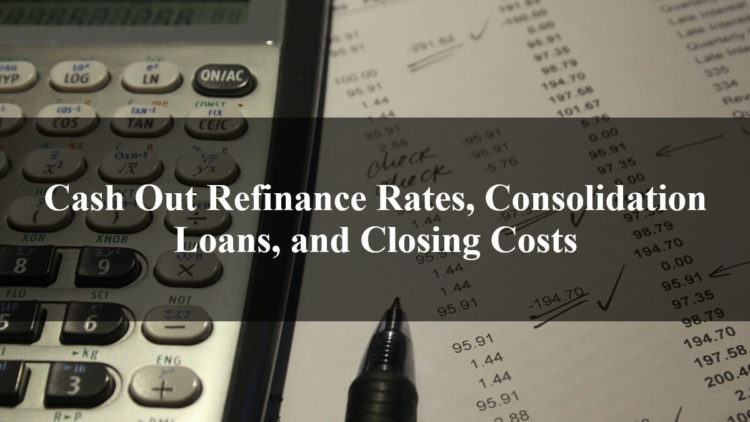Cash Out Refinance Rates, Consolidation Loans, and Closing Costs
Are you looking for consolidation loans or cash out refinance rates? Understanding cash out mortgage rates and cash out refinance closing costs can help when searching for the right lender. Every lender has variable pricing adjustments and often an advertised rate can be very appealing.
Understanding Cash Out Refinance Rates / Closing Costs
One lender may have a rate that sounds appealing, but what they do not tell you there are closing costs associated with the loan. When it comes to cash out mortgage rates, the interest rate can either cost or credit a borrower. Each rate yields a credit or you can pay discount points.
Loan Pricing Adjustments
There are variable pricing adjustments and every lender is different. Some lenders advertise rates that do not always make sense, but are available at the time. They even have a certain type of borrower that they are looking for depending on the type of loan. What rate makes sense and what is advertised will depend on pricing adjustments.
Common pricing adjustments vary by lender and often include adjustments on:
- Loan amount.
- Appraised value.
- Loan-to-value.
- Refinance purpose.
- Occupancy.
- Property type.
- Number of units.
- State and county.
- FICO credit score.
- Lock period – 15 days, 30 days, 60 days… etc.
- Compensation type (borrower paid or lender paid compensation).
- Escrow / impound waiver.
- Loan term.
- Loan type.
- And other adjustments.
A licensed Loan Originator should take the time to go over your scenario for live pricing. Depending on the mortgage company, pricing adjustments can vary and the base rate for adjustments depends on the lender. When a lender gives true cash out refinance rates, remember that the pricing is time sensitive and not final until the interest rate is locked for a specific period of time. The cost or credit can change throughout the day if the rate is not locked.
Cash out refinance closing costs vary by lender, which will be explained later.
Cash Out / Consolidation Loans – Guidelines Vary
A solution to overwhelming high-interest debt may be to consolidate debt into a mortgage by a debt consolidation refinance. Conventional cash out refinance guidelines and other consolidation loans vary by mortgage company because some mortgage companies have an overlay, which an internal guideline on top of agency guidelines.
Advantages of Cashing Out and Consolidating Debt
Debt consolidation loans often have lower interest rates than high interest credit cards, personal loans, car loans, or other types of debts. A debt consolidation refinance can allow borrowers to make one low monthly payment instead of several, which often results in paying less overall each month.
According to the Federal Reserve, the average assessed interest on credit cards is 17.14%.
- Historically, your creditors charge more in interest on cars, credit cards, personal loans, and other types of debts than a home loan.
Other debts are also amortized over a shorter period of time and debt consolidation loans can free up cash flow. You may be able to take advantage of the cash out refinance rates in order to save money.
Conventional Cash Out Refinance Guidelines
In order to see if you qualify, you should reach out to a Loan Originator to go over documentation required for underwriting and processing. They will run an Automated Underwriting System (AUS) to determine your eligibility.
Three C’s of Underwriting
Without running the Automated Underwriting System (AUS), a Loan Originator or underwriter will not know if you are pre-approved. The best way to start the eligibility process is to ask for a application checklist so they can verify the Three C’s of underwriting and determine your eligibility by analyzing the credit risk assessment to determine if it meets agency guidelines.
Credit Reputation
This system takes all of the information on your credit to determine if you meet agency guidelines. Factors can include:
- FICO credit score.
- Recent derogatory events and past.
- Credit accounts – type, age, limits, status, and usage.
- Requests for new credit in the past 12 months.
Capacity
Debt-to-income ratios are a big factor and there is no universal number that you should follow to see if you qualify. Your situation is unique and there are too many little factors to manually calculate if you qualify, but there are reasonable debt-to-income ratios to follow.
Cash reserves, employment, number of borrowers, and characteristics of the loan also play a factor.
Collateral
Collateral is often determined by equity or down payment, property type, usage, and other factors.
The minimum credit score for a conventional loan is 620 FICO credit score, but often FHA can be a great option for borrowers when comparing consolidation loans and cash out refinance rates.
Fannie Mae Maximum Cash Out Limits
Generally Fannie Mae’s Maximum Standard Eligibility Requirements are determined when running the Automated Underwriting System, but are as follows:
- For principal residences, the maximum cash out amount is 80% and 75% loan-to-value (LTV) for 2 to 4 units.
- Second home: 75% loan-to-value (LTV)
- For investment properties, the maximum cash out is 75% LTV for 1 unit and 70% for 2 to 4 units.
There are investment portfolio options that allow higher LTV and take no personal debt-to-income into consideration. The debt-service coverage loans even allow a property to close in an Limited Liability Company (LLC) or corporation.
Debt service coverage is calculated by dividing the rent by the mortgage payment (principal, interest, taxes, insurance, and association dues).
Freddie Mac’s Maximum Cash Out LTV
Freddie Mac’s maximum LTV ratios are similar to Fannie Mae. For primary residence:
- 1 unit maximum loan-to-value is 80%.
- 2 to 4 unit 75%.
Second home maximum loan-to-value is 75% and investment properties are:
- 1 unit maximum loan-to-value is 75%.
- 2 to 4 units is 70%.
Other Cash Out Mortgage Rates
FHA cash out refinance rates can often be more competitive than conventional interest rates depending on the pricing adjustments and credit score. It is always a good option to price out both scenarios so you can understand the benefits of each type of loan. The new FHA cash out refinance guideline maximum LTV is 80%
Only some lenders allow 100% cash out for a VA cash out refinance – some lenders cap the maximum cash out to 90% LTV. VA cash out mortgage rates are very competitive with no mortgage insurance.
Cash Out Refinance Closing Costs
Closing costs are categorized by the following on a Loan Estimate (the Loan Estimate is always over disclosed for compliance purposes):
A. Origination Charges:
These can include lender fees like discount points, application fee, underwriting fee, processing fee… etc. Every Lender is different when it comes to loan costs and some may have an appealing rate, but understanding the closing costs associated with the rate helps compare cash out refinance closing costs.
B. Services You Cannot Shop For:
These can include appraisal, credit report, upfront mortgage insurance premiums (financed or paid at closing), and other miscellaneous fees. These are variable depending on the type of loan, credit reporting agency, appraisal management company.. etc.
C. Services You Can Shop For:
These are generally title fees associated with the loan and vary by state and title company.
D. Total Loan Costs:
A summary of all the loan costs.
E. Taxes and Other Government Fees:
These are charges by the County or Municipality. They depend on where the property is located.
F. Prepaids:
If taxes or insurance are due within the first payment date, they will be included in this section. This is to insure that the property taxes or home owner’s insurance premium is paid before your first payment date. Depending on the day you close and the cash out refinance rates, per diem is charged and will vary.
G. Initial Escrow Payment at Closing:
If you did not waive escrows, there will be an appropriate amount for upcoming taxes and insurance. There is typically a two month cushion added to this account in case of any increase in the future. You can think of this as a bank account for you so that the lender can automatically pay upcoming taxes and insurance. If you refinance or sell the home, you will be refunded the current balance of the escrow account.
Loan Estimates are Over Disclosed
The estimated cash to close on the Loan Estimate is not always a good deciding factor if you want to move forward with a refinance or purchase. These numbers are over disclosed for compliance purposes and each section either has a tolerance in change or no tolerance. What you will actually bring to close or receive, typically changes as figures become available and more accurate. Your Loan Originator can go over the Loan Estimate and let you know what will change before closing.




